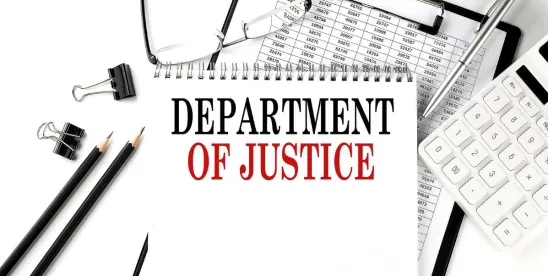Many have speculated as to how white-collar enforcement may change during President Trump’s second term. A recent memorandum by the Head of the Department of Justice’s (“Department”) Criminal Division, Matthew R. Galeotti, sheds light on that issue. Specifically, on May 12, Galeotti issued a memorandum—“Focus, Fairness, and Efficiency in the Fight Against White-Collar Crime” (the “Galeotti Memorandum”). Galeotti covers a number of topics in the memorandum, including the “three core tenets” that the Criminal Division will follow when prosecuting white-collar matters. Those tenets are: “(1) focus; (2) fairness; and (3) efficiency.” We will cover each of those pillars in three posts this week. This post delves into the first tenet—focus.
As an initial matter, the Galeotti Memorandum affirms the Department’s commitment to “do justice, uphold the rule of law, protect the American public, and vindicate victims' rights.” He emphasizes the “significant threat to U.S. interests” that white-collar crime poses. Galeotti explains that the Department is adopting a “targeted and efficient” approach to white collar cases that “does not allow overbroad enforcement to harm legitimate business interests.” Galeotti further cautioned that governmental overreach “punishes risk-taking and hinders innovation.”
Under the focus prong, the Galeotti Memorandum directs prosecutors to concentrate on issues that pose a “significant threat to US interests.” Galeotti first walks through the harms stemming from white-collar crime, including:
- The exploitation of governmental programs, including health care fraud and defense spending fraud;
- The targeting of U.S. investors or actions that otherwise undermining market integrity, such as elder fraud, investment fraud, and Ponzi schemes;
- The targeting of monetary systems that compromise “economic development and innovation;”
- Threats to the American economy and national security; and
- The corruption of the American financial system.
In light of those harms, Galeotii identifies the following priority areas for the Criminal Division:
- Health care fraud and other waste, fraud, and abuse;
- Trade and customs fraud;
- Elder fraud, securities fraud, and other fraud facilitated by variable interest entities;
- Complex money laundering, including “Chinese Money Laundering Organizations;”
- Fraud targeting “U.S. investors, individuals, and markets;”
- Crimes that compromise national security;
- Corporate support of “foreign terrorist organizations;”
- Crimes implicating “the Controlled Substances Act and the Federal Food, Drug, and Cosmetic Act;”
- Money laundering and bribery implicating “U.S. national interests,” “national security,” competition, and the benefit of “foreign corrupt officials;” and
- Criminal conduct that involves “digital assets that victimize investors and consumers,” use those assets to further “other criminal conduct,” and “willful violations that facilitate significant criminal activity.”
In addition, the Department will focus on identifying and seizing the proceeds of crimes included in the list above and using those proceeds “to compensate victims.” Prosecutors will also prioritize crimes “involving senior-level personnel or other culpable actors, demonstrable loss,” and obstruction of justice.
The Department is also expanding its Corporate Whistleblower Awards Pilot Program to prioritize tips that result in forfeiture in areas such as:
- Conduct involving “international cartels or transnational criminal organizations;”,
- Federal immigration law violations;
- Conduct “involving material support of terrorism;”
- “Corporate sanctions offenses;”
- Corporate conduct involving “[t]rade, tariff, and customs fraud;” and
- Procurement fraud by corporations.
As noted above, we will delve into the other two prongs of the Galeotti Memorandum—fairness and efficiency—in two, follow-up posts. The first prong makes clear, however, that the Department is still focused on white collar crime—particularly in the health care industry.






 />i
/>i
